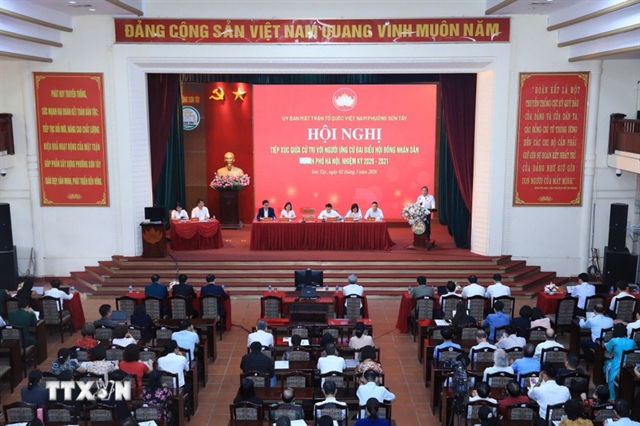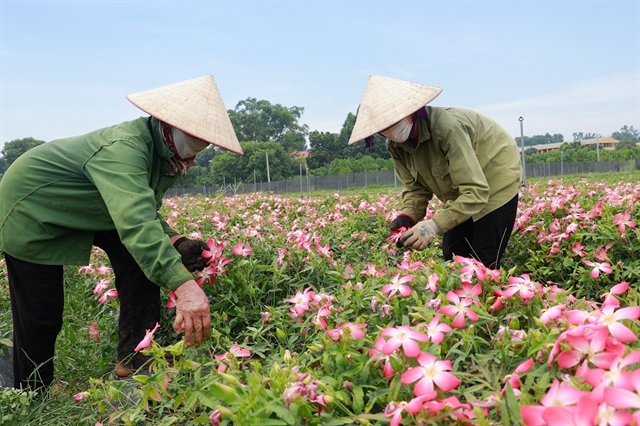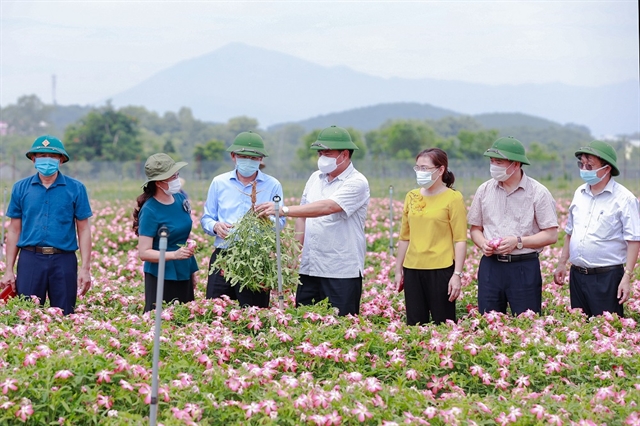 Society
Society


|
| Early last year, Phúc Lâm Hi-tech Agriculture Cooperative in Thanh Mỹ Commune of Sơn Tây Town started planting organic Bồ Chính ginseng on low efficient maize field. Photo Hà Nội's Department of Agriculture and Rural Development |
HÀ NỘI — More safe agricultural production areas, known as 'green zones' or 'pesticide-free zones' have appeared in Hà Nội’s suburban areas thanks to efforts made by the city’s agriculture sector in changing farming methods, protecting the ecosystem and creating safe products.
Phương Đình Commune in Đan Phượng District is a good example of a green zone with a ban on burning straw.
Nguyễn Văn Thành, Chairman of the Commune Farmers' Association, said that local farmers were taught to use organic products to compost waste and rice straw with microbial products to enrich soil and produce safe products.
In banning the burning of straw, the local authority held a conference with members of co-operatives. They signed a commitment to refrain from burning straw after harvesting.
“Farmers are given probiotics to make organic fertiliser from straw in the field. As a result, after harvesting rice, people would not burn straw. Straw burning causes environmental pollution,” he said.
“On-site straw treatment not only helps reduce costs relating to buying chemical fertilisers but also improves the soil’s fertility, minimises impacts of smoke and dust in the air, and most noticeably, ensures the health of farmers," Thanh said.
Đan Phượng District Farmers' Union also regularly trained and instructed farmers on organic breeding models.
The association implemented a pilot project in Hồng Hà commune and then expanded it to other communes in the district.
Farmers were asked to move livestock farms far from residential areas to avoid possible environmental pollution. Currently, two livestock co-operatives in Trung Châu and Phương Dinh communes moved their breeding areas out of residential areas.
The district has also seen the rise of high-tech organic agricultural models including for orchids in Đan Hòa Commune, grapes, Cuối Quý organic vegetables and Minh Nghĩa mushrooms.
Local farmers and authorities are co-ordinating with other agencies to develop brands for Trung Châu Biosafety Pork Products, Đan Phượng flowers, Phương Đình meat and Đan Phượng mushroom.
Traditional products also include Long Trường Tửu Wine, Song Phượng peanut candy and Thái Cam’s nem Phùng (fermented pork).
Early last year, Phúc Lâm Hi-tech Agriculture Cooperative in Thanh Mỹ Commune of Sơn Tây Town converted five hectares of maize and cassava to organic Bồ Chính ginseng.

|
| Deputy Minister of Agriculture and Rural Development Trần Thành Nam (fourth from left) visits an organic farm of Phúc Lâm Hi-tech Agriculture Cooperative in Thanh Mỹ Commune of Sơn Tây Town. Photo Hà Nội's Department of Agriculture and Rural Development |
Uông Tuyết Nhung, director of the co-operative, said that in the organic production process, the co-operative used fertilisers and pesticides made from natural ingredients.
Although the cost of organic farming was high, organic products were very safe for consumers, she said.
The co-operative collects about 200-300kg of fresh ginseng flowers daily to make ginseng flower tea.
In addition, ginseng branches and leaves are pruned to make cosmetics for skin care.
A one-year-old Bồ Chính ginseng plant can produce tubers. It is estimated if all ginseng flowers, leaves, branches and tubers are collected, a hectare of ginseng can generate income of more than VNĐ1 billion per year.
Similarly, in Phú Xuyên district, farmers have stopped using pesticides. According to head of the district’s Plant Protection Station Lương Văn Hoan, the district has 27 communes and towns with 6,800ha of rice and more than 300ha of vegetables. In recent years, farmers have reduced the use of pesticides.
The average amount of pesticides used in the district in 2020 was only 0.26kg/ha/year.
Nguyễn Thị Thu Hằng, director of Hà Nội’s Agricultural, Forestry and Fisheries Quality Control Sub-Department, said that there were more and more safe production areas – agricultural 'green zones' – appearing on the outskirts of the city.
The city has established more than 200 concentrated rice production areas (from 50ha to 300ha/region) with a total area of more than 40,000ha and 5,044ha of safe vegetables, and more than 50ha of organic vegetables.
Nearly 50 high-quality flower growing areas were formed.
Hà Nội now has 164 agricultural production models applying high technology, bringing high economic efficiency to farmers and creating favorable conditions to trace the origin of agricultural products and foods sold on the market, she said.
Director of Hà Nội’s Department of Agriculture and Rural Development Chu Phú Mỹ said organic and green agricultural products met high requirements on food hygiene and safety, contributing to solving the problem of food safety.
“Organic production contributes to sustainable environmental protection as no chemicals are used. Thanks to organic production, farmers have better health and higher income if implementing proper methods and technologies,” he said. — VNS




